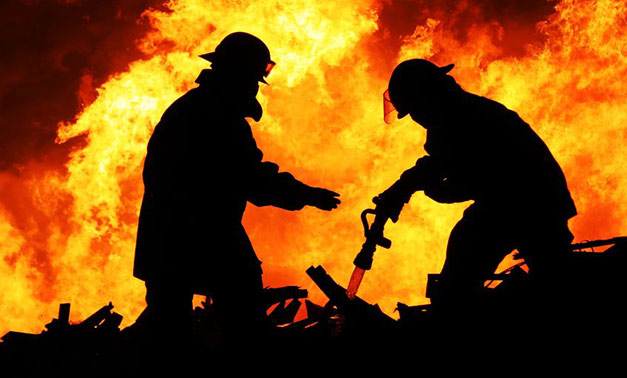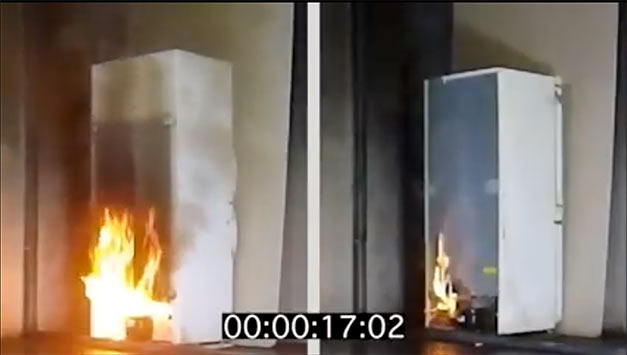Study pinpoints fridge fire hazards
5th March 2017UK: A number of components and flammable materials used in domestic refrigerators are identified in a new study into the reported 300 fridge fires a year in Great Britain.
The number and severity of domestic fridge/freezer fires has prompted the London Fire Brigade to describe them as the most dangerous household appliances.
A paper presented at last week’s Institute of Refrigeration evening meeting examined the evidence collected via fire investigations in London between 2005 and 2015 where fridges or freezers were involved. It looked at the reasons for the cause and spread of the fires and potential design changes to fridges and freezers that could be used to reduce the risk, spread and consequences of these fires.
Fridge/freezers are one of the few appliances which run continuously and are not designed to be isolated at night or when left unattended. This makes it vitally important that they should be designed and manufactured to ensure the chance of fire is very low, and that should a fire occur it then remains contained within the appliance and not be able to spread.
However, fires caused by fridge/freezers have been found to exhibit a higher degree of fire spread than other types of appliances like washing machines, dishwashers or tumble dryers. The study pinpoints a number of components that can fail and act as an ignition source and these are located in close proximity to an extensive source of flammable material.
Failures of starter relays, PTC switches, mechanical defrost switches and capacitors were identified as ignition sources, while plastic drip trays, twin-wall backing materials and polyurethane foam insulation panels have been identified as causes for the escalation and spread of the fire.
The failure of starter relays is said to typically cause severe heating to the coil assembly and external heat damage to the adjoining cabling. However, it recognises that since the switch to PTC starters the number of incidents is now less common and in decline.
PTC starter switches can degrade over time and arcing can occur which is sufficient to melt the metal contacts within the switch.
Water penetration into the casing of the mechanical defrost switch can produce severe arcing to the switch contacts. The study observes that, while the external switch cover is constructed of fire resisting plastic, the cogs within the switch have a high nylon content and will readily burn. “Once the cover has distorted and started to melt, the internal components are then exposed to the atmosphere, the switch components will burn and spread the fire to the switch cover and to the appliance insulation,” the study says.
Capacitors are subjected to various types of stress over the lifetime of the appliance which can cause it to age and eventually fail. The study maintains that a capacitor failure can range from a simple failure of its circuitry leading to a slow melting and degrading to form char, to a dramatic and violent ignition or pressured eruption.
In addition, LFB fire investigations suggest that changes in fridge/freezer construction materials and design have resulted in a more flammable construction.
While the evaporation trays housed on top of the compressor were previously made of thin metal, recent designs have used plastic trays which, in the event of a fire, promote flame spread to the appliance insulation.
Blown hydrocarbon foams have now replaced the slab-constructed internal insulation panels previously used. Fire tests are said to have shown that this new insulation burns very rapidly, generating high heat release rates.
The steel metal backs previously used in fridge/freezers have also been replaced by materials which can be easily ignited. These include a silvered cardboard or foil barrier covered by polyurethane or more recently twin-wall polyethylene/polypropylene panels. Fire tests have revealed that twin-wall backing materials are very easily ignited and can promote extremely rapid flame spread to involve insulation panels, whilst producing intense heat and large volumes of toxic smoke.
The study suggests a number of changes to reduce the likelihood and severity of fridge/freezer fires, including the use of high quality standard components; containing potential ignition sources in metal boxes; a return to metal drip trays; adding fire retardant to insulation foam or applying it to insulation surfaces; fitting a non-combustible or fire retardant covering at the back of the appliances.
Related stories:
https://www.coolingpost.com/uk-news/lfb-calls-for-end-to-dangerous-fridges/









